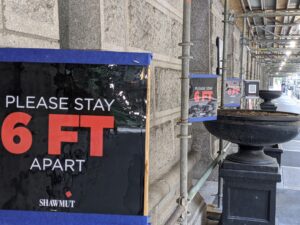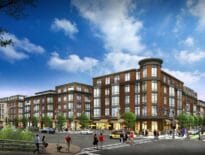
Signs mark locations where workers waiting to enter the Langham Hotel in Boston’s Financial District should stand to maintain social distancing. Renovations to the hotel were among the local construction projects halted by the COVID-19 shutdown. Photo by James Sanna | Banker & Tradesman Staff
During the early stages of the ongoing pandemic, the Boston and Cambridge lodging market was one of the most heavily–hit markets in the country. As part of the state’s phased reopening process, hotels were allowed to reopen in June; however, it became clear that most hotels would take a more cautious approach to restarting operations.
As of the first week of July some hotels have remained closed, others have opened with limited inventory, while others may face permanent closure. Additionally, the pipeline of proposed hotels for Boston and Cambridge has been disrupted due to construction delays, an eight-week moratorium on all construction in Boston, a similar 10-week moratorium in Cambridge, lack of financing and general uncertainty.
COVID-19 has negatively impacted lodging demand for years to come and dramatically changed the local market’s room supply. As the number of cases increased locally in early to mid-March, government officials declared a state of emergency, restricting travel and large gatherings. Many hotels in Boston and Cambridge began operating at single–digit occupancy rates, forcing owners to close and layoff, furlough, or reduce hours of their workforce. The hotels which remained open during these months, many of which are in close proximity to the city’s major hospitals, only remained open to accommodate patients, first responders and other contract demand.
Counting on a Regional Resurgence
As of March 1, the Boston and Cambridge lodging market was made up of 114 hotels with over 25,900 rooms. Based on information provided to Pinnacle Advisory Group from individual hotel owners and operators as well as the Greater Boston Convention & Visitors Bureau, we know that many hotels closed during the last week of March. As a result of these closures, we have estimated that available rooms supply in March was reduced by approximately 15 percent of its actual amount.
In April, 65 percent of the market’s rooms were offline and in May the number of closed rooms increased further to over 75 percent. Although hotels were permitted to reopen June 8, only a select few hotels reopened in the month, increasing the market’s supply to only 30 percent of its actual size. Operators are optimistic that pent-up leisure demand and the market’s ability to capture the regional travelers from the Northeast will help to increase lodging demand in the summer and fall months. For this reason, a considerable number of hotels have plans to reopen in July and August.
Based on the planned reopening dates provided to Pinnacle Advisory Group, approximately 60 percent of the market’s room supply will be open in July and will then increase to approximately 85 percent in August. Outside of the properties which may be closed permanently, we expect most hotels to be open by September. However, we understand that there is a considerable amount of uncertainty in today’s market as it relates to the spread and threat of COVID-19 and reopening plans will likely change.
New Rooms Near 1,000
Pinnacle Advisory Group reported on the new hotels opening in 2020 and 2021 in January of this year and had forecasted rooms supply in Boston and Cambridge to increase 3.8 percent in 2020, well above its long-term average annual growth rate of 2.4 percent. Six hotels with almost 1,000

Rachel Roginsky
new rooms were expected to launch throughout 2020. Additionally, there were a considerable number of rooms which came online in the second half of 2019, and both The Langham and The Taj (now The Newbury) were expected to reopen following renovations in the second half of 2020.
The forecasted increase to the market’s rooms was to represent the second year in a row with supply growth of over 3 percent and the second highest increase in rooms supply since the Great Recession in 2008-2009.
Based on conversations with hotel developers, brands and operators with projects underway in Boston and Cambridge, the hotels which were under construction in March of 2020 will be delayed to varying degrees. Those which were in the final stages of construction and near completion are expected to be delayed two to four months. Hotel projects that were in earlier stages with openings later next year could face longer delays depending on the size of the project. When accounting for the delayed openings and the temporary closures that began in March, room supply is now expected to increase 1.8 percent in 2020.

Sebastian J. Colella
Owners and operators in the Boston and Cambridge lodging market enjoyed considerable growth in revenue over the last 10 years. However, that growth began to slow in 2017 as market fundamentals began to shift. The impact from the ongoing pandemic hit the market in mid to late March and has since devastated its performance and disrupted its supply.
As owners and operators prepare for changes to their day-to-day operations, many of which will increase operating costs, we do not believe that market fundamentals – a combination of demand and room rates – are likely to return to previous levels for three to five years.
Rachel Roginsky is the founder and principal of Boston-based Pinnacle Advisory Group and Sebastian J. Colella is a vice president.




 |
| 

